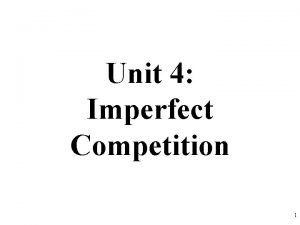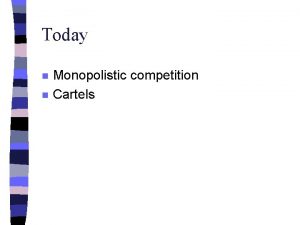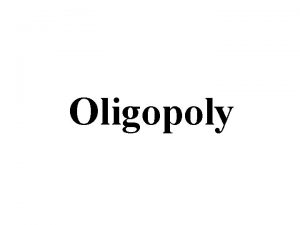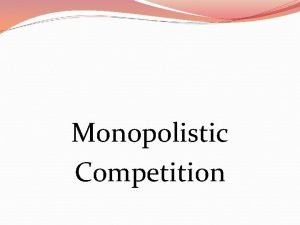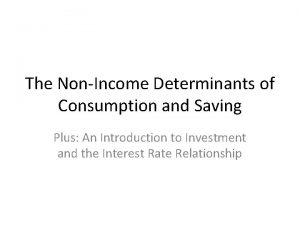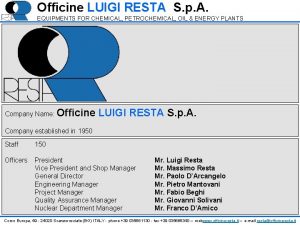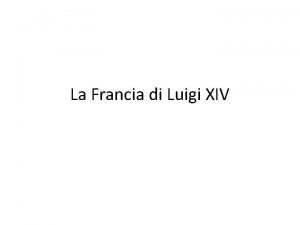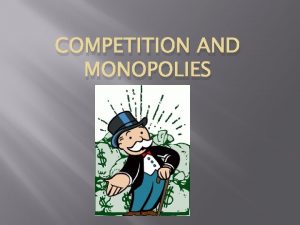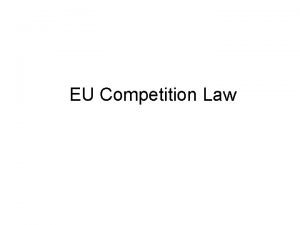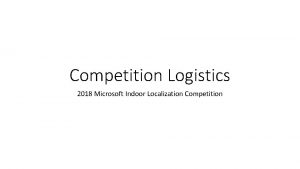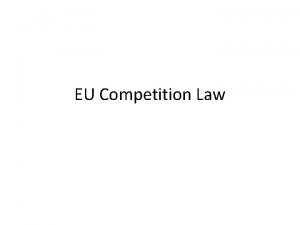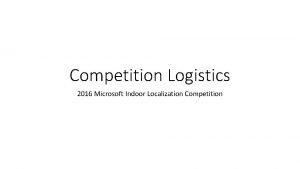Political Determinants of Competition Mara Faccio and Luigi
























- Slides: 24

Political Determinants of Competition Mara Faccio and Luigi Zingales June 2016

Motivation • Very large literature in IO about technological determinants of competition in each industry. • Yet, political sector can impact competition in many ways: – – – licenses and restrictions on entry (Djankov et al. , 2002), tariffs and import licenses (Beckman, 1999), direct intervention on prices, expropriation of non-government owned operations, regulatory decisions, and antitrust intervention, or just the threat of intervention (or lack thereof). • Is there a political effect on competition?

Outline 1. Are regulated sectors different? 2. Why the mobile sector is a good one to analyze 3. Impact of political connections on competition in the mobile sector 4. Impact of competition on market outcomes 5. Why do we care?

1. Are regulated sectors different?

Democracy on Competition

2. Why Telecommunication? • Important sector where – technology is similar across countries – there no huge natural advantages (water, cheap energy, etc. ) – there are very good data both on prices and quality – still very regulated at the national level (barriers in Europe) • Focus on mobile sector – Better data – Less legacy issues

Data • Telecom quality and prices: – International Telecommunication Union • UN specialized agency for Information and Communication Technologies – Groupe Speciale Mobile Association • association of nearly 800 operators, and more than 250 companies in the broader mobile sector • Other Telecom Prices: – Numbeo (web site for cost of living adjustments)

Other Data • Institutional variables: – Polity IV Democracy: (additive eleven-point scale (0 -10)_ • Presence of institutions and procedures through which citizens can express effective preferences about alternative policies and leaders. • Existence of institutionalized constraints on the exercise of power by the executive. • Guarantee of civil liberties to all citizens in their daily lives and in acts of political participation. • Connections – Extension of Faccio (2006) – Biographies of over 50, 000 executives and “top” employees affiliated with the telecom operators from Capital IQ. Political connection: Fraction of executives and board members of a given operator who served as government minister, chief of state, or member of parliament • Competition?


Market Share of the Largest Four Operators (U. S. ) 0. 4 0. 35 0. 3 0. 25 First Operator 0. 2 Second Operator Third Operator 0. 15 Fourth Operator 0. 1 0. 05 2000 2001 2002 2003 2004 2005 2006 2007 2008 2009 2010 2011 2012 2013 2014 2015 0 Note: Q 1 2000 through Q 3 2015. Based on GSMA data.

3. Political connections and competition

Is this effect plausible? • Political control over: – Licenses – Auctions and conditions of auctions – Antitrust enforcement in mergers – Antitrust enforcement against potential collusion on prices • We study the 4 largest changes in C 2 in absolute value – All driven by political decisions

4. Impact of competition on market outcomes • • • Prices/mark-ups/revenues per customer Quality Investments Employment Wages Churn

Price of What? 1. ITU: price of a standard basket of mobile monthly usage for 30 outgoing calls per month (on-net, off-net to a fixed line and for peak and off-peak times) in predetermined ratios, plus 100 SMS messages, 2. GSMA: ARPU = average revenue per unit 3. Effective price per minute 4. Ebitda Margin

Competition and Prices -OLS

Competition and Prices -IV

Competitions

Time Series Evidence

Competition and Quality

Competition and Investments

Summary • More competition leads to lower prices • No (or positive) effect on quality and investments • No effect on employment, wages, and churn •

Why do we care about marketpower? • Not because of the Harberger’s triangle (it is small) • But because of 1. Rent seeking (Tullock (1967), Kruger (1974)) 2. Negative distributional effects – Important in determining the standard of living of average American – Potential determinant of inequality • Carlos Slim lost $27 bn in wealth as a result of deregulation

Size of the Transfer

Conclusions • More political connections and less democracy lead to more concentration • More concentration leads to – Higher mobile prices – No more investments, employment, or quality of service • Low levels of competition represent a significant tax on consumers • Can this explain the raising inequality?
 Federico faccio
Federico faccio Ascolto e dimentico vedo e ricordo
Ascolto e dimentico vedo e ricordo Ti faccio una domanda
Ti faccio una domanda Characteristics of monopoly
Characteristics of monopoly Perfect competition vs monopolistic competition
Perfect competition vs monopolistic competition Market structure venn diagram
Market structure venn diagram Perfect competition vs monopolistic competition
Perfect competition vs monopolistic competition Matrix multiplication inverses and determinants
Matrix multiplication inverses and determinants Applications of matrices and determinants
Applications of matrices and determinants What factors affect personality
What factors affect personality Matrices formulas
Matrices formulas Non income determinants of consumption and saving
Non income determinants of consumption and saving Luigi sabino
Luigi sabino Resta s
Resta s Intendenti luigi xiv
Intendenti luigi xiv Russolo
Russolo Luigi argenziano
Luigi argenziano Madre luigi xiv
Madre luigi xiv Officiers luigi xiv
Officiers luigi xiv Luigi xiv capo della chiesa
Luigi xiv capo della chiesa Istituto vanvitelli lioni
Istituto vanvitelli lioni Luigi gallone
Luigi gallone Luigi gaudio professore
Luigi gaudio professore Futurismus znaky
Futurismus znaky Luigi v
Luigi v



